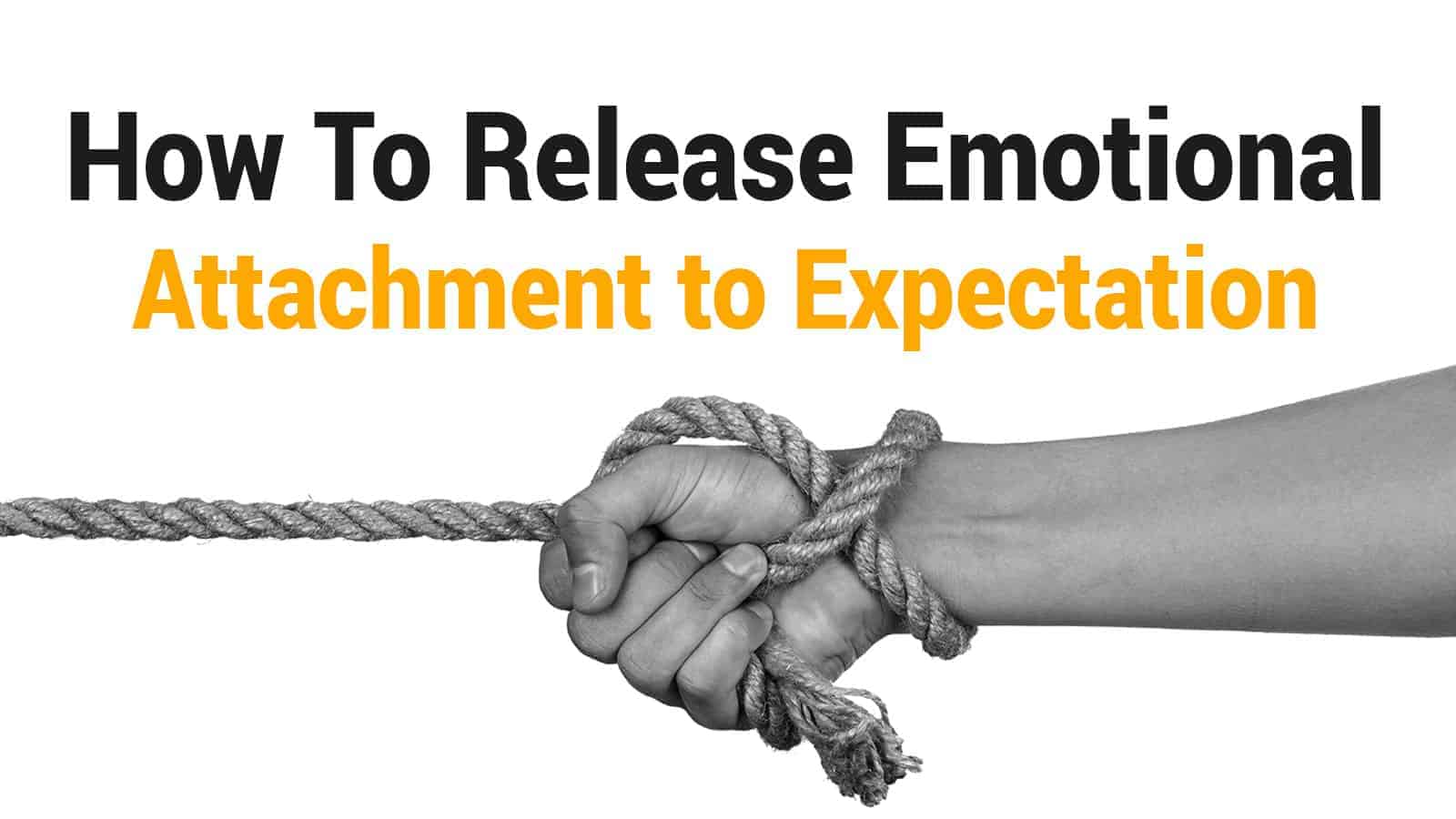We’ve all been in a situation where we’ve hoped for something only to have it fall through. It can be challenging to recover from such a painful blow, but it’s even more difficult if you feel a desperate emotional attachment to what you hoped would be. Your expectation–and confidence–feel crushed.
Sadly, it never pays to be too attached to something that hasn’t yet been guaranteed.
Here’s How To Release Emotional Attachments To Expectation
Breaking free from unreasonably expecting things is possible with time and effort. Here are some ways to release yourself.
1. Accept That You Don’t Know Everything
A considerable part of non-attachment is being okay with not knowing. Unfortunately, there’s no way to know about everything in life. You have to accept that you don’t have all the answers and that you can’t control anything in life.
When you get hung up on knowing everything, you obsess over the future and try to play complicated mental chess games to figure out what is most likely to happen. To some degree, it’s good to plan for strong possibilities, but always attempting to protect yourself against every possible outcome isn’t going to work.
The world is not black and white. The most unexpected things can happen. Sometimes, your best bet is to get your positive thinking going, take a deep breath, and go through with your plans with cautious hopes and realistic optimism. Hoping for the best and having confidence that you can weather any misfortune goes a long way.
2. Stay Calm
Staying calm is a great way to remove emotional attachments. It shows that these events do not have control over you – you have control over you, and that’s that.
This doesn’t mean you can’t have emotional responses to certain situations. You’re allowed to react strongly to experiences and unexpected events, and it’s perfectly valid to feel that way. But you should also learn to remain calm in these situations to avoid doing things you regret. Here’s how to practice staying calm:
· Count
Now, count to ten in your mind and focus on those numbers going up. You can also count down if that helps you. Give yourself those ten seconds to think, let go of the initial rush of emotion, and release the attachment to them.
· Meditate
Daily meditation can have an overall positive effect on your patience and emotional control, mental health, and positive thinking. If you do this, you may be able to control your emotions and reactions in the moment better. Meditation apps are available to help in those situations.
· Breathe
Feel the feelings riling too high up? Release your attachment to them by breathing. Take a deep breath in for eight counts, hold for four counts, and exhale for seven counts, then repeat. You can also practice on your own to see which counts work best for you.
· Control
Again, you cannot control all events, but they don’t need to have control over you. Strengthening your grip over your mind and mental faculties can help provide you with better control over your emotions in the heat of the moment.
· Walk Away
If you’re having trouble controlling yourself, request five or ten minutes to calm yourself down in a separate room. Removing yourself from a situation indicates that you aren’t attached to it in a big way.
3. Don’t Consider Any One Thing The “True” One
When you’re excited about a new job, a new relationship, or a unique opportunity of any kind, try not to put so much stock on it that it becomes the “one.” Yes, it’s good to aim for what you want, but you risk idealizing it to the point where it feels like your only option.
When you elevate these kinds of dreams to such a high level, you wind up being completely crushed and demotivated when they fall through. These types of fantasies will ultimately only harm you in the long run. You need to maintain some degree of realism, even if your positive thinking is through the roof.
There is no such thing as a true “one” – only things are right for you at certain times in your life. If you don’t get something you want, it’s because it wasn’t what was meant for you at the time.
4. Take Control Of Change
If you feel like your life is spiraling out of control, it’s hard to detach yourself from the emotional aspects of it. You likely feel this way because you can’t control some of the situations in your life.
There’s no quick fix to feeling like you have no control because the fact is that you often don’t. But there is a way you can work on emotional detachment. If a change is happening around you, take control of things you can change. For example:
- Change how you react to situations
- Redecorate your home; you don’t have to spend money, just move furniture around and reorganize
- Get a new haircut, try a new hair dye, or try a unique fashion style
- Declutter your old things; throw out what you no longer need
- Try a new skill or hobby
- Go out to meet new friends
- Watch a new show or play a new game
- Cook a different style of food
- Eat somewhere you’ve never eaten before
5. Do Not Berate The Part Of You That Is Attached
It’s easy to hate the parts of yourself that are emotionally attached, but you should be kind to those parts of you. Often, they’re much smaller parts than you think – they only feel big because you’ve devoted so much energy and time to them.
If it helps, you can try to think of these parts of you as separate entities. These parts are hurt and frightened. When you scold or are harsh on them, you’re just scaring them more, pushing them further into their terrified states.
You need to understand yourself and why you are emotionally attached. Then, gently teach those parts of you how to let go. Be firm but compassionate, and tend to those parts of your soul. You will find that a little love and care go a long way in helping the attached pieces.
6. Shift Your Perspective
When emotions run high, and attachment is strong, it’s challenging to focus on anything else. That’s why taking the time to shift your perspective actively can help you see the bigger picture instead of getting hung up on, the smaller details.
Sometimes, things make it feel like the world is ending, but that’s because you’re seeing an up-close version of what is happening. Take a step back and zoom out. What’s happening around you? Is this worth losing your cool over?
Consider whether this issue will still be terrible a day, a week, a month, or a year from now. In most cases, the things that drive us insane don’t matter for more than a couple of days. Remember that the next time you feel like you may lose your temper! Some things just aren’t worth it, and if it doesn’t matter in the long run, why sweat it?
Plus, when you put it all into perspective, you’ll find many things worth being happy about. Research indicates that even trying to be happy can positively affect mental health!
7. Be Grateful
This goes hand in hand with shifting your perspective, but on a much larger scale. Learn to be grateful for everything in life. When things go well, be thankful for all your success and good turns of events.
But what about when your expectations go wrong? You can still manage to be grateful. When things go sideways, be grateful that:
- There are good things to learn from this situation
- The situation is not as bad as it could be
- You can learn from this and get better
- You were able to find a silver lining
It’s a good idea to keep a gratitude journal where you list at least three things you feel grateful for per day. These things can be massive, such as earning a new promotion, resolving an argument, or winning a competition, but they can also be small. Here are some simple ideas of what to be thankful for:
- Having a roof over your head
- Access to food and water
- Access to utilities like electricity, gas, and heating
- The coffee you have in the morning
- The clothes you have
- The people in your life
- A meal you enjoyed recently
- Your good health
- Your favorite songs, bands, or music
- Your favorite movies or TV shows
This isn’t to become some consistently happy and excitable person – it’s to learn to appreciate the small things in life. Gratitude boosts positive thinking to the next level, completely changing how you think and behave.
When you have a mindset of gratitude all the time, it is easier for you to release emotional attachments that come from expectations because you’re always thankful for the situations at hand.
8. Keep Your Options Open
Scarcity makes you attach a lot of hype and emotions to expectations. Just like making a particular option, the “one” is harmful to your positive thinking, a lack of options and a reluctance to maintain many options can also be unfortunate for you.
When you’re anxious about losing things like time, chances, or money, you can slip into an anxiety-ridden state where the feeling of scarcity controls you. As such, you should never narrow yourself down to the point where you have barely any options.
It’s always a good idea to have a Plan B, C, D, and so on. Having alternatives can prevent this overwhelming emotional attachment to your expectations. Here are some examples of how to avoid being cornered:
- Apply for multiple jobs and envision having more than one good offer
- Imagine three different dream houses
- Organize three different paths to a particular goal; start by sticking to one, then if that fails, shift to another
Final Thoughts on Releasing Emotional Attachments to Expectation
Expectations are everywhere in life, and they’re often unavoidable. It’s good to have some hopes for yourself. It keeps you motivated and working towards your goals. But having too strong an emotional attachment to those expectations can hurt you more than it helps. Learning to release those attachments will have a positive effect on you overall.
















 Community
Community

